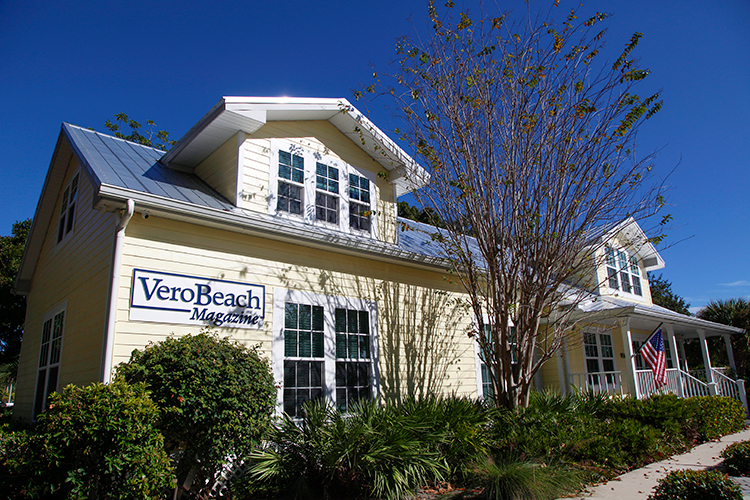
Two longtime members of the local media community aren’t going to be as local as they were.
In separate news releases last week:
- The Gannett-owned Treasure Coast Newspapers, which include the Press Journal in Indian River County, announced the company will close its printing and packaging plant in Port St. Lucie in mid-January and produce the paper more than 100 miles from Vero in Deerfield Beach.
- The Palm Beach Media Group, a wholly owned subsidiary of Michigan-based Hour Media, announced it had acquired the assets of Vero Beach Magazine from Beth Moulton, an island resident who founded the publication 24 years ago.
Predictably, the new owners assured local readers the changes will have no negative impact on their products.
“We have long admired what Beth Moulton and her team have created with this excellent publication,” Terry Duffy, group publisher of the Palm Beach Media Group, said in the company’s announcement. “We look forward to continuing their model of success.”
Two days earlier, Treasure Coast Newspapers/TCPalm.com Executive Editor Adam Neal said readers shouldn’t experience any delivery delays or decline in service, and they can expect a “seamless transition” – despite the fact that the Press Journal will be printed starting in January just outside of Fort Lauderdale.
“We are committed to continuing to serve the Treasure Coast with quality local journalism and impactful advertising,” Neal said in a story the company published in its print editions and on its website last week. “Where the newspapers are published does not affect how our local journalists cover the communities.”
Actually, it does
Especially at daily newspapers.
Take it from someone who has spent more than 40 years in the business, working at newspapers of all sizes in markets across America: The farther from home newspapers are printed, the earlier the deadlines.
The handful of reporters and editors who work for the Press Journal will need to move up their already-too-early deadlines to allow for the time required to truck the papers from northern Broward County to Vero Beach, so they can be delivered locally.
The Press Journal also will find itself competing for press time not just with the Fort Lauderdale Sun-Sentinel – which built the Deerfield Beach printing plant – but with the Miami Herald and the Palm Beach Post, who for some years have also printed their papers there.
That means even less late-breaking news will be found in your morning Press Journal, except in rare circumstances when deadlines are pushed back to accommodate special events deemed worthy of the additional expense.
But that’s fine with the Treasure Coast Newspapers brass, which operates as a web-first news outlet that often posts its content on TCPalm.com days before it appears in print editions.
Embracing that philosophy, however – along with the company’s failed attempt to sell regional news to Vero Beach readers who don’t care about what’s happening in Stuart or Port St. Lucie – has contributed mightily to the Press Journal’s dwindling circulation and dissipating impact on our community.
The hard truth is that the Press Journal, which in the mid-1990s was delivered to 70 percent of the households in Indian River County, is no longer a must-read newspaper here.
So Neal might be right: Printing the paper at a plant four counties to the south probably won’t make much of a difference.
Vero Beach 32963 has for some years been THE local newspaper on the island, and its sister paper, Vero News, THE local newspaper on the Indian River County mainland.
As for the sale of Vero Beach Magazine, there’s more reason for optimism, given the impressive track record of Palm Beach Media Group, which also publishes Palm Beach Illustrated, Naples Illustrated, Fort Lauderdale Illustrated, Jupiter Magazine, Stuart Magazine and Florida Design.
The group’s parent company, Hour Media, is the nation’s largest publisher of city and regional magazines, including high-profile publications in Atlanta, Cincinnati, Detroit and Los Angeles.
And according to Moulton, the new ownership has embraced Vero Beach Magazine’s “mission to support the local community” by providing the staff here with the resources of a larger, more sophisticated publishing group.
“This will take the magazine to a whole new level, and it’ll be done with the same staff we have now,” Moulton said in a phone interview Monday. “The new ownership isn’t moving anyone in.”
I’m sure that’s the plan – for now, anyway.
Certainly, the Hour Media folks are saying all the right things, with the company president, John Balardo, calling Vero Beach Magazine a “20-year-plus success story” and its chief executive officer, Stan Wanczyk, crediting Moulton for building a “respected publication that has been part of the Florida publishing landscape for decades.”
But this is no longer Mouton’s baby, even though she said she remains the “landlady” of the building in which the magazine operates.
It’s a corporate acquisition.
The Palm Beach group and its parent company will expect Vero Beach Magazine to produce profits as well as a glossy publication. If they’re not satisfied, you can be sure they will move people in and, if necessary, push people out.
Gannett’s decision to close the Port St. Lucie printing plant – and put the facility up for sale – will result in the elimination of 46 full-time and 27 part-time press and packaging jobs.
That decision wasn’t made locally.
Nor will any future decisions regarding Vero Beach Magazine, now that it’s owned by the Palm Beach group, which is owned by Hour Media, which has more than 300 employees and offices in Alabama, California, Florida, Georgia, Michigan, Minnesota and Ohio.
So while supporting the community and serving the public interest are admirable pursuits for the local magazine and daily newspaper, their fates will be determined by their profitability.
The same, of course, applies at this newspaper.
That decision, though, will be made in ZIP code 32963.



